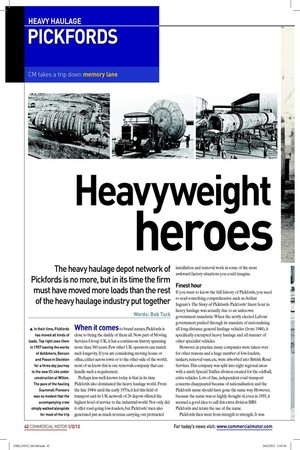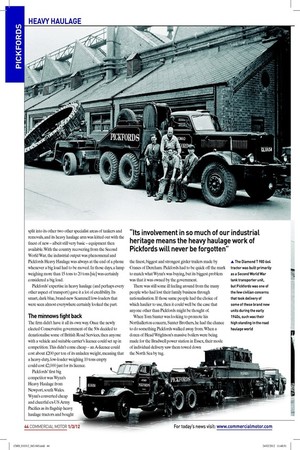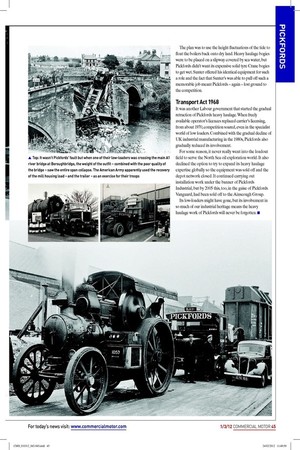Heavyweight
Page 35

Page 37

Page 38

If you've noticed an error in this article please click here to report it so we can fix it.
heroes
The heavy haulage depot network of Pickfords is no more, but in its time the firm must have moved more loads than the rest of the heavy haulage industry put together
Words: Bob Tuck When it comes to brand names, Pickfords is close to being the daddy of them all. Now part of Moving Services Group UK, it has a continuous history spanning more than 360 years. Few other UK operators can match such longevity. If you are considering moving house or ofice, either across town or to the other side of the world, most of us know this is one removals company that can handle such a requirement.
Perhaps less well-known today is that in its time Pickfords also dominated the heavy haulage world. From the late 1940s until the early 1970s, it led this ield of transport and its UK network of 26 depots offered the highest level of service to the industrial world. Not only did it offer road-going low-loaders, but Pickfords’ men also generated just as much revenue carrying out protracted installation and removal work in some of the most awkward factory situations you could imagine.
Finest hour
If you want to know the full history of Pickfords, you need to read something comprehensive such as Arthur Ingram’s The Story of Pickfords. Pickfords’ inest hour in heavy haulage was actually due to an unknown government mandarin. When the newly elected Labour government pushed through its mandate of nationalising all long-distance general haulage vehicles (from 1948), it speciically exempted heavy haulage and all manner of other specialist vehicles.
However, in practice many companies were taken over for other reasons and a huge number of low-loaders, tankers, removal vans, etc, were absorbed into British Road Services. This company was split into eight regional areas with a ninth Special Trafics division created for the oddball, extra vehicles. Lots of ine, independent road transport concerns disappeared because of nationalisation and the Pickfords name should have gone the same way. However, because the name was so highly thought of, even in 1955, it seemed a good idea to call this extra division BRS Pickfords and retain the use of the name.
Pickfords then went from strength to strength. It was split into its other two other specialist areas of tankers and removals, and its heavy haulage arm was kitted out with the inest of new – albeit still very basic – equipment then available. With the country recovering from the Second World War, the industrial output was phenomenal and Pickfords Heavy Haulage was always at the end of a phone whenever a big load had to be moved. In those days, a lump weighing more than 15 tons to 20 tons [sic] was certainly considered a big load.
Pickfords’ expertise in heavy haulage (and perhaps every other aspect of transport) gave it a lot of credibility. Its smart, dark blue, brand-new Scammell low-loaders that were seen almost everywhere certainly looked the part.
The minnows fight back
The irm didn’t have it all its own way. Once the newly elected Conservative government of the 50s decided to denationalise some of British Road Services, then anyone with a vehicle and suitable carrier’s licence could set up in competition. This didn’t come cheap – an A-licence could cost about £200 per ton of its unladen weight, meaning that a heavy-duty, low-loader weighing 10 tons empty could cost £2,000 just for its licence.
Pickfords’ irst big competitor was Wynn’s Heavy Haulage from Newport, south Wales.
Wynn’s converted cheap and cheerful ex-US Army Paciics as its lagship heavy haulage tractors and bought the inest, biggest and strongest girder trailers made by Cranes of Dereham. Pickfords had to be quick off the mark to match what Wynn’s was buying, but its biggest problem was that it was owned by the government.
There was still some ill feeling around from the many people who had lost their family business through nationalisation. If those same people had the choice of which haulier to use, then it could well be the case that anyone other than Pickfords might be thought of.
When Tom Sunter was looking to promote his Northallerton concern, Sunter Brothers, he had the chance to do something Pickfords walked away from. When a dozen of Head Wrightson’s massive boilers were being made for the Bradwell power station in Essex, their mode of individual delivery saw them towed down the North Sea by tug. The plan was to use the height luctuations of the tide to loat the boilers back onto dry land. Heavy haulage bogies were to be placed on a slipway covered by sea water, but Pickfords didn’t want its expensive solid tyre Crane bogies to get wet. Sunter offered his identical equipment for such a role and the fact that Sunter’s was able to pull off such a memorable job meant Pickfords – again – lost ground to the competition.
Transport Act 1968
It was another Labour government that started the gradual retraction of Pickfords heavy haulage. When freely available operator’s licences replaced carrier’s licensing, from about 1970, competition soared, even in the specialist world of low loaders. Combined with the gradual decline of LJK industrial manufacturing in the 1980s, Pickfords also gradually reduced its involvement.
For some reason, it never really went into the loadout ield to serve the North Sea oil exploration world. It also declined the option to try to expand its heavy haulage expertise globally so the equipment was sold off and the depot network closed. It continued carrying out installation work under the banner of Pickfords Industrial, but by 2005 this, too, in the guise of Pickfords Vanguard, had been sold off to the Ainscough Group.
Its low-loaders might have gone, but its involvement in so much of our industrial heritage means the heavy haulage work of Pickfords will never be forgotten. n












































